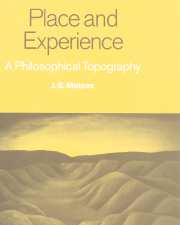Book contents
- Frontmatter
- Contents
- Acknowledgments
- Introduction: the influence of place
- 1 The obscurity of place
- 2 The structure of spatiality
- 3 Holism, content and self
- 4 Unity, locality and agency
- 5 Agency and objectivity
- 6 Self and the space of others
- 7 The unity and complexity of place
- 8 Place, past and person
- Conclusion: the place of philosophy
- Bibliography
- Index
5 - Agency and objectivity
- Frontmatter
- Contents
- Acknowledgments
- Introduction: the influence of place
- 1 The obscurity of place
- 2 The structure of spatiality
- 3 Holism, content and self
- 4 Unity, locality and agency
- 5 Agency and objectivity
- 6 Self and the space of others
- 7 The unity and complexity of place
- 8 Place, past and person
- Conclusion: the place of philosophy
- Bibliography
- Index
Summary
Only a creature whose structure affords it the possibility of movement can be a sensing being.
Erwin Strauss, The Primary World of the SensesAlthough my primary concern in this investigation is, as I have indicated previously, with the sort of ‘conceptualised’ experience that is characteristic of human experience, and with thought as it is associated with judgment and conceptuality, many of the connections that are of special interest to this investigation, and that obtain between spatiality, agency and experience, actually arise at a very primitive level. Earlier I noted that any creature capable of directed movement, either of its whole body or of parts of its body, must not only be located within some space in which such movement is possible, but must also possess a grasp of that space (although not necessarily a conceptual grasp) both as it is subjectively presented and as it is independent of any particular perspective within it. And this must apply to any creature, whether or not it has a capacity to think in terms of concepts. Likewise, the capacity for organised, directed behaviour – for action – is crucial in enabling the organisation and integration of mental life, in general, irrespective of the conceptual abilities of the creature concerned.
- Type
- Chapter
- Information
- Place and ExperienceA Philosophical Topography, pp. 109 - 137Publisher: Cambridge University PressPrint publication year: 1999



